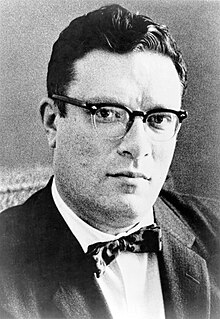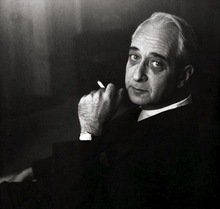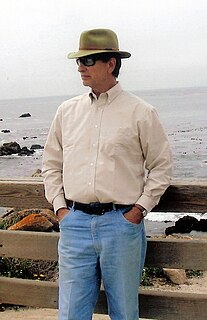
Isaac Asimov was an American writer and professor of biochemistry at Boston University. He was known for his works of science fiction and popular science. Asimov was a prolific writer who wrote or edited more than 500 books and an estimated 90,000 letters and postcards.

James Benjamin Blish was an American science fiction and fantasy writer. He is best known for his Cities in Flight novels, and his series of Star Trek novelizations written with his wife, J. A. Lawrence. He is credited with creating the term "gas giant" to refer to large planetary bodies.

John Crowley is an American author of fantasy, science fiction and historical fiction. He has also written essays. Crowley studied at Indiana University and has a second career as a documentary film writer.

John Simmons Barth is an American writer who is best known for his postmodernist and metafictional fiction.

William Howard Gass was an American novelist, short story writer, essayist, critic, and philosophy professor. He wrote three novels, three collections of short stories, a collection of novellas, and seven volumes of essays, three of which have won National Book Critics Circle Award prizes and one of which, A Temple of Texts (2006), won the Truman Capote Award for Literary Criticism. His 1995 novel The Tunnel received the American Book Award. His 2013 novel Middle C won the 2015 William Dean Howells Medal.
Charles de Lint is a Canadian writer of Dutch origins. He is married to—and plays music with—MaryAnn Harris.

Lionel Mordecai Trilling was an American literary critic, short story writer, essayist, and teacher. He was one of the leading U.S. critics of the 20th century who traced the contemporary cultural, social, and political implications of literature. With his wife Diana Trilling, whom he married in 1929, he was a member of the New York Intellectuals and contributor to the Partisan Review.

Charles Richard Johnson is an African-American scholar and the author of novels, short stories, screen-and-teleplays, and essays, most often with a philosophical orientation. Johnson has directly addressed the issues of black life in America in novels such as Dreamer and Middle Passage. Johnson was born in 1948 in Evanston, Illinois, and spent most of his career at the University of Washington in Seattle.

Phillip Lopate is an American film critic, essayist, fiction writer, poet, and teacher. He is the younger brother of radio host Leonard Lopate.

The Quantum Rose is a science fiction novel by Catherine Asaro which tells the story of Kamoj Argali and Skolian Prince Havyrl Valdoria. The book is set in her Saga of the Skolian Empire. It won the 2001 Nebula Award for Best Novel and the 2001 Affaire de Coeur Award for Best Science Fiction. The first third of the novel appeared as a three-part serialization in Analog magazine in the 1999 May, June and July/August issues. Tor Books published the full novel in 2000.
Alan Kaufman is an American writer, memoirist and poet. He is the author of the memoirs Jew Boy and Drunken Angel, the novel [Matches], and is listed as editor of The Outlaw Bible of American Poetry.
John R. Keene Jr. is a writer, translator, professor, and artist who was named a MacArthur Fellow in 2018.
Leslie What is a writer of fantasy and literary fiction and nonfiction. She grew up in Southern California and attended Santa Ana College, and earned a certificate in Vocational Nursing. She also attended California State University Fullerton and received her MFA in Writing from Pacific University in 2006.

Yan Lianke is a Chinese writer of novels and short stories, based in Beijing. His work is highly satirical, which has resulted in some of his most renowned works being banned in China. He has admitted to self-censorship while writing his stories in order to avoid censorship.

Lloyd Edward Kropp is an American novelist, composer, and educator. Kropp achieved popular acclaim after the publication of his third and fourth novels One Hundred Times to China and Greencastle. Greencastle was nominated for a Penn/Faulkner Award and was named to one of the American Library Association's "Best Books of the Year" lists in 1985. For this novel the author received the "Illinois Author of the Year" award from the Illinois Association of Teachers of English (IATE). His books have been favorably reviewed in many journals and newspapers in the United States, Great Britain, and Spain.
Robert James Collas Lowry was an American novelist, short story writer, illustrator, and independent press publisher.

Samuel R. Delany, Chip Delany to his friends, is an American author and literary critic. His work includes fiction, memoir, criticism and essays on science fiction, literature, sexuality, and society.

Peter Selgin is an American novelist, short story writer, playwright, essayist, editor, and illustrator. Selgin is Associate Professor of English at Georgia College & State University in Milledgeville, Georgia. He is also a former affiliate faculty member at Antioch University's Low-Residency MFA Creative Writing Program in Los Angeles, California.

Jonathan Dee is an American novelist and non-fiction writer. His fifth novel, The Privileges, was a finalist for the 2011 Pulitzer Prize for Fiction.
A novelist is an author or writer of novels, though often novelists also write in other genres of both fiction and non-fiction. Some novelists are professional novelists, thus make a living writing novels and other fiction, while others aspire to support themselves in this way or write as an avocation. Most novelists struggle to get their debut novel published, but once published they often continue to be published, although very few become literary celebrities, thus gaining prestige or a considerable income from their work.













